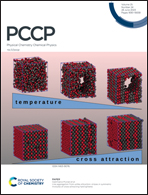Spin–orbit splitting and piezoelectric properties of Janus Ge2XY (X ≠ Y = P, As, Sb and Bi)†
Abstract
The coexistence of spin–orbit coupling and piezoelectricity in a single material may have potential application in multifunctional devices, including spintronics, nanorobotics and piezotronics. Spin–orbit coupling provides a new means to manipulate electron's spin without an additional external magnetic field, while piezoelectricity refers to the interplay between mechanical stresses and electric polarization. Using first-principles calculations, the structural, electronic, optical, spin, and piezoelectric properties of the Janus Ge2XY (X ≠ Y = P, As, Sb, and Bi) monolayers were systematically investigated. All the Ge2XY are energetically and dynamically stable in the α phase. At the GW level, Ge2AsSb, Ge2AsBi, and Ge2SbBi have direct fundamental band gaps of 0.65, 0.64, and 0.91 eV. At the GW + BSE level, their optical gaps are 0.42, 0.45, and 0.63 eV, and the optical absorption coefficients can reach about 10−5 cm−1 in the infrared light region, which reveals that they have potential for application in infrared photodetectors. For Ge2PBi, Ge2AsBi, and Ge2SbBi containing the heavy Bi element, the lowermost conduction band and uppermost valence band have large spin splitting along the M–K and K–Γ lines, and the bands near the Fermi level possess Rashba spin splitting at the Γ point. Ge2PBi and Ge2SbBi have both large in-plane piezoelectric coefficients d11 (−0.75 and −3.18 pm V−1) and out-of-plane piezoelectric coefficients d31 (0.37 and 0.30 pm V−1). Our findings are helpful to understand the mechanism of the spin–orbit physics and piezoelectricity of Janus Ge2XY monolayers and guide experiments in exploring novel multifunctional materials.



 Please wait while we load your content...
Please wait while we load your content...